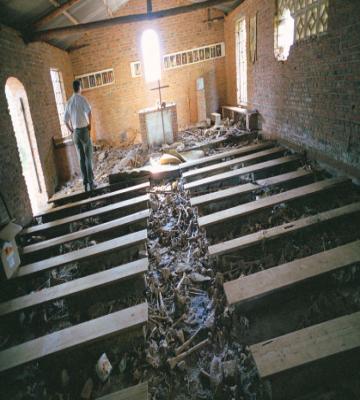As we remember the twentieth anniversary of the genocide in Rwanda, I’m remembering where I was and what I was doing when the horror began on April 6, 1994. I was working at Human Rights Watch’s Washington, DC office, where my job was to be the organization’s liaison with the U.S. Government. As reports from the killing fields started to come in, my colleagues and I distributed them to policy makers and the press. HRW’s Rwanda expert, Dr. Alison Des Forges, came down to Washington to work with our team.
I remember those early weeks of the genocide most vividly because of Alison. She had been in and out of Rwanda for many years and had hundreds of friends – many of them members of the Tutsi ethnic minority. Her Tutsi friends all over Rwanda went into hiding as the killings, launched by the Rwandan army, security forces and militia, spread to local communities where eventually tens of thousands or ordinary people picked up clubs and machetes and murdered their neighbors – on orders from local political leaders. Every day, friends would call Alison at Human Rights Watch from their hiding places. They would beg, “When are the U.N. forces coming to protect us?” Eventually, all the calls stopped. All of Alison’s friends had been found and killed, along with their every sibling, parent, and child. She lost them all.
The Rwanda genocide was completely shattering. Because of my love for Alison and her closeness to so many Tutsi Rwandans who died, the carnage became for me personal, in a way that nothing else in my two decades of human rights work had been before. Moreover, I was appalled that my government did nothing to save the lives of nearly a million people and wholly disillusioned about my own efforts as a well-connected human rights professional, which made not a bit of difference to anything.
And to be honest, the Rwanda genocide made me mad as hell at God. I wasn’t actually a Christian at the time, but I must have wanted there to be a good God, even if I didn’t actually believe in one. But any nascent hopes or illusions were blown to smithereens by the genocide. Here’s the deal: you can believe in a sovereign God who is active in the world, or you can believe your own eyes about what happened during the Rwanda genocide. But you can’t believe in both. That was my take-away from the genocide, and those didn’t change for a very long time.
Gary Haugen, IJM’s founder and President, had an entirely different take-away than mine from the Rwanda genocide. For one thing, he got a lot closer to it than I did. Gary was a lawyer at the U.S. Department of Justice at the time. He was detailed by the DOJ to the United Nations to conduct the first investigation of the genocide within just a few weeks of when the mass killings ended. He went around the country collecting evidence while it was still very fresh on the ground: masses of bodies of children, women and men – including tens of thousands who were murdered in the churches to which they had fled for sanctuary.
Gary’s iron-clad conviction, when he emerged from the horror, was that he wanted to do something with his life, as a Christian and a lawyer, to contribute to protection and justice for the poor. And within a few months of returning from Rwanda, he began the process of creating International Justice Mission. It started in the basement of his townhouse, and he was employee number one.
I got to know Gary in those early months after he returned from Rwanda. I was an angry atheist at the time, but I loved his commitment to starting an organization that cared about violence against the poor. That was what I cared about, too. And here was this Christian guy who wanted to work against violence as an expression of his faith. I’d never seen anything like it in my life.
I stayed in close touch with Gary and with the tiny IJM staff that eventually swelled to hundreds of staff. I wasn’t a Christian, but Gary’s example and the work of IJM forced me to start thinking differently about Christians and the God of Justice whom they served. It was the beginning of my own long, stumbling, surprising journey towards God.

